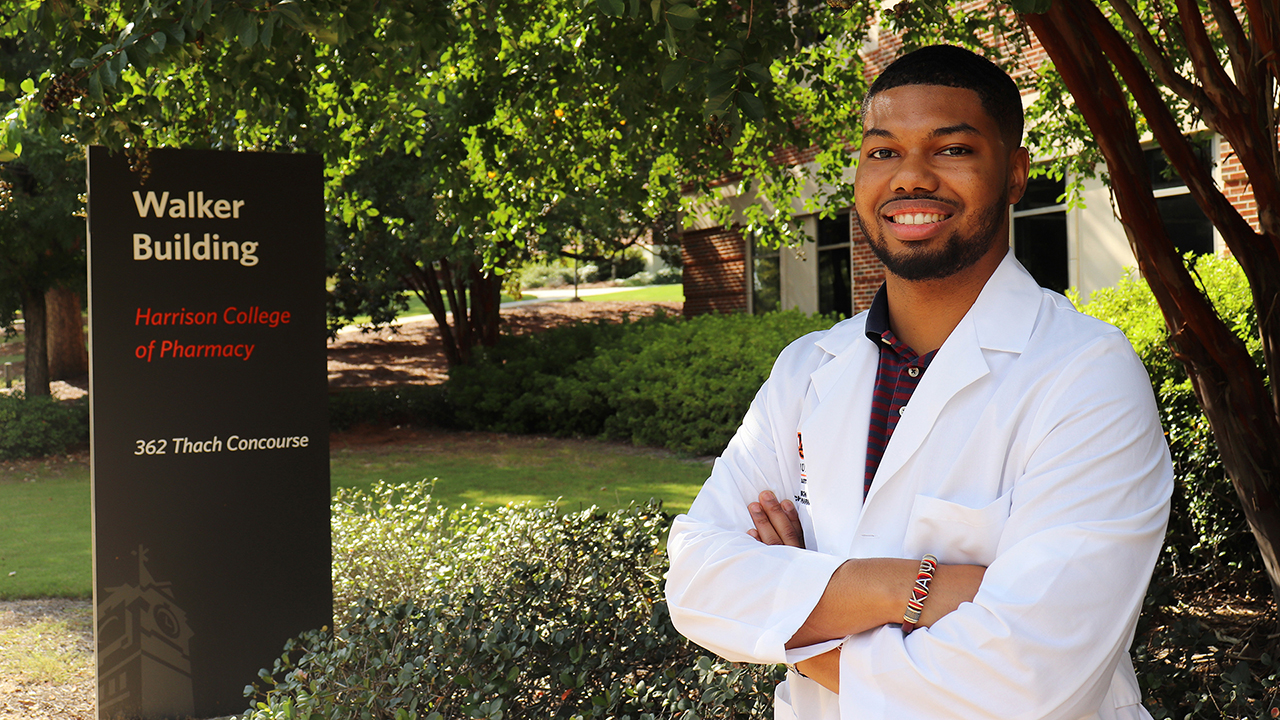content body

Little did Miles Wiley know that those hours of binge-watching CSI, Chicago Med and NCIS in middle school would result in him conducting research at one of the top colleges of pharmacy in the country.
"I decided to attend Tuskegee University to follow my parent’s footsteps,” Wiley said. “I actually wanted to be a forensic scientist as I started a chemistry major.”
During his junior year, Wiley became interested in drug development after learning under Dr. Albert Russell, professor and department head in organic chemistry at Tuskegee.
“I wanted to pursue a Ph.D. to discover and develop novel therapeutics to treat neurodegenerative and neuropsychiatric diseases,” said Wiley. “I feel like minorities are the ones most affected by neuropsychiatric diseases, and I want to help ease the burden on patients and their families.”
When making the decision to continue his studies at the Harrison College of Pharmacy, the choice was obvious.
“I chose Auburn because of the proximity to my undergraduate school, Tuskegee University. I volunteered in the lab my senior year first under Dr. Amit Mitra and then under Drs. Vishnu Suppiramaniam and Miranda Reed,” said Wiley. “Dr. Vishnu is a Tuskegee alum, and he taught my mom and godmother while they were earning their masters. It was an easy transition into his lab.”
Wiley began his research in the field of oncology, the study and diagnosis of cancer. Shortly after, he switched to research neuroscience, specifically focused on tetrahydrocannabinol (THC), which is the substance that creates the “high” when smoking marijuana.
His investigation of the molecular and electrophysiological mechanisms underlying prenatal cannabinoid exposure mediated alterations are focused on synaptic plasticity and memory.
“I decided to pursue neuropharmacology instead of oncology because when I explored neuroscience, it was like a light bulb went off,” said Wiley. “I want to always be in a field that is innovative and has a great outlook on the future. When it clicked, I knew this is what I want to study for the rest of my life.
“The field of neuroscience is expected to grow in the next 30 years. Alzheimer’s and dementia are expected to increase. Specifically, in THC research, the psychoactive effects are well documented, and the neuropsychiatry area is an unmet need.”
In recognition of his outstanding work, Wiley was invited to attend the Scientist Mentoring and Diversity Program (SMDP) in San Diego, California, this past summer.
The five-day intensive program recruits highly ranked members in the pharmaceutical industry faculty who work in the medical technology, biotechnology and consumer health care industries across the country to mentor doctoral student researchers from underrepresented racial and ethnic groups.
“Over the first three days, you are paired with an industry mentor, typically a vice president or someone high up, and for an entire year they are working with you to develop your industry resume, introducing you to other members in the pharmaceutical industry that have similar career paths, as well as getting you ready for industry,” said Wiley. “My mentor through SMDP is Dr. Cathy Rhee, a senior scientist at the Biopharmaceutical company AstraZeneca.”
After completing the SMDP program and attending the largest biotechnological conference in the world, the BIO International Convention, Wiley returned to HCOP with a plethora of new connections and enhanced research skills as he works toward an anticipated 2025 graduation date.
“SMDP has led me to develop additional partnerships for our various research projects,” said Wiley. “My specialty in synaptic plasticity and learning memory and Alzheimer’s disease has led us to potential collaborations to help develop and test their drugs in our models.
"I’m excited to finalize my dissertation and work alongside my mentor to help further our research at HCOP.”




